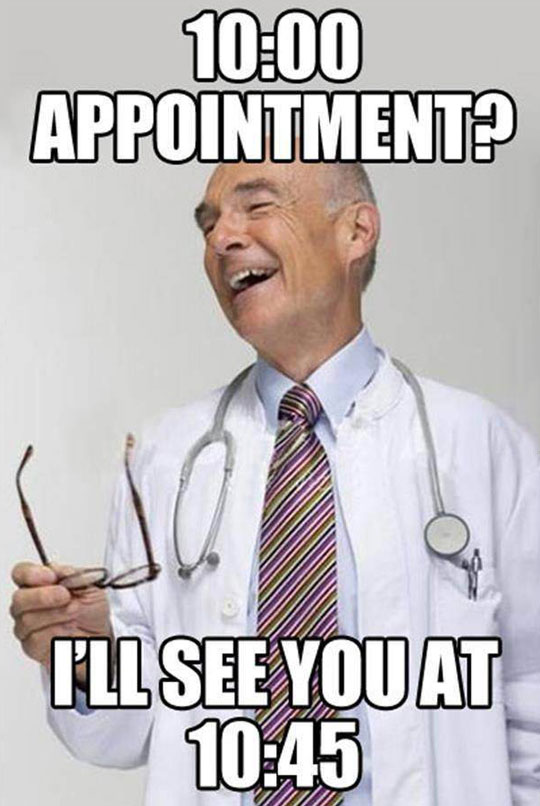What Time Was My Appointment? by Pat Conrad MD
“Why do doctors always keep me waiting?” a relative asked me recently. Foolishly, I started in on the myriad reasons why appointment times begin the day as mere suggestions and wind up as elusive desires by 3 p.m. And then I started explaining about the insurance mill that has to be cranked up, and how each claim must be fed in and cooked for an indeterminate amount of time that requires all the smelling, sifting, stirring, and sipping of craft beer, without any of the satisfaction, requiring a staff roughly equivalent to a Kardashian’s makeup posse, to move all these bits of parasitic data from one virtual bin to another. I explained that doctors often get calls from the ER, urgent pharmacy questions, “oh by the way” patient problems snuck in past the 15-minute visit slot, and of course the server going down, halting the whole assembly line until the IT wizard arrives. Nope, the relative didn’t want to hear it, she just wanted to tell me how awful, disrespectful, and lunch delaying the whole mess is, and of course she is right. But that doesn’t make this mess an easy mess.
In fact it stinks worse than that C. Diff sample forgotten in the patient bathroom over the weekend. I happened across a Business Insider article called “Why your doctor always keeps you waiting“, which handles the question nicely. It’s very realistic, and by the time you have read through the author’s morning of primary care, you will get the gut-knot feeling of having slogged through it with her. The author adequately demonstrates that traditional primary care docs are undervalued, and underpaid, for a variety of reasons, and promises to offer some solutions in her follow up article. She does wonder whether a system works that crams patients into 15-minute slots in order to pay the bills.
One approach of course, might be to free up some time and lower the overhead. Ignoring regulations that make your office more expensive might be a good reason to quit dealing third-party insurance, government or private. Releasing your billing manager and coding human resources into the economic stream might be tough, but aren’t they getting expensive? How much are you paying the IT guy for ICD updates every 6 months? Seeing fewer patients per day, with more scheduling flexibility would have to improve one’s ability to give comprehensive care. A friend of mine who went “cash-only” in 2002 (at $35 per visit) had one staff member, and bragged that he never had a patient wait more than 20 minutes.
It will be interesting to read this article’s follow-up solutions, but I’ll be skeptical if they don’t include steps to permanently take back control of her practice and her customer relations.










Pretty much accurate. Except in my world Mrs High Copay wants 6 or 8 problems addressed, and she wants it all coded as “prevention” so she won’t have to pay anything. I notice that the ones who do this (as well as the ones who make an appointment for one things and then have 5 or 6) are the ones who bitch the most about waiting, That’s because the last 3 patients before them did the same stupid stunt they’re doing.
I usually try for first appointment of day and problem begins here with my doctor. The nursing staff is not ready to begin at 8am, so my 8am appointment begins somewhere around 8:15 or later. With all the other problems in a typical office, if you begin late, it is almost impossible to catch up.
I’ve been DPC since 2008, before DPC had a name. My patients rarely wait. If they do, I apologize. Their response is usually, “Hey, It’s OK. I know if I ever needed extra time you would give it to me too”.
It was never, “I’m going to report you to the online authorities”.
Waiting time is a non-issue in DPC.
I beieve this could be alleviated somewhat by Doctors posting the following in their waiting rooms for all to see: “NOTICE Patients will be seen in the order of their appointment times.”
Down here in Florida it is not uncommon to have people set an appointment for 2:30PM and then show up at 10:00AM. Naturally, they wish to be seen in the order that they arrived in the office.
Just a suggestion. I realize emergencies occur and I believe the receptionist should keep those waiting apprised of these occurrences which are rare. However, Mr Hotshot will be unable to get an appointment and then arrive early because he does not want to interfere with his Tee time at the local golf course.
Far and away the commonest cause from me being significantly late, to the point that patients complained (and likely to give you a poor patient satisfaction score) , was responding to an emergency call while being on unassigned ER call. The only possible answer was to limit ER call. Once I started doing that, mostly by limiting what types of cases I would accept, my patient satisfaction scores went up while my hospital administration satisfaction scores plunged. Best of both worlds.